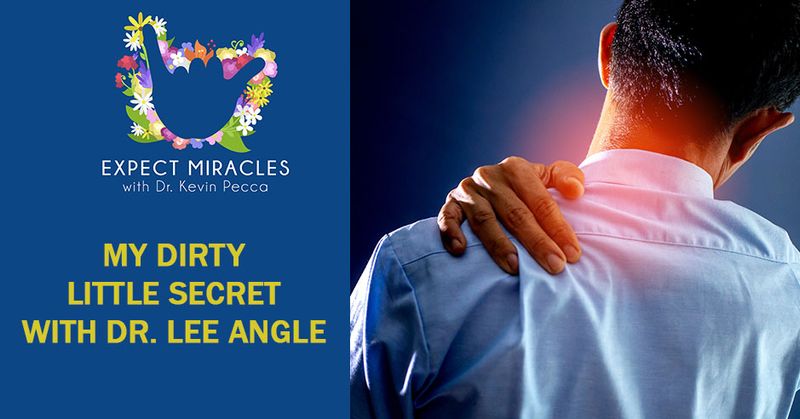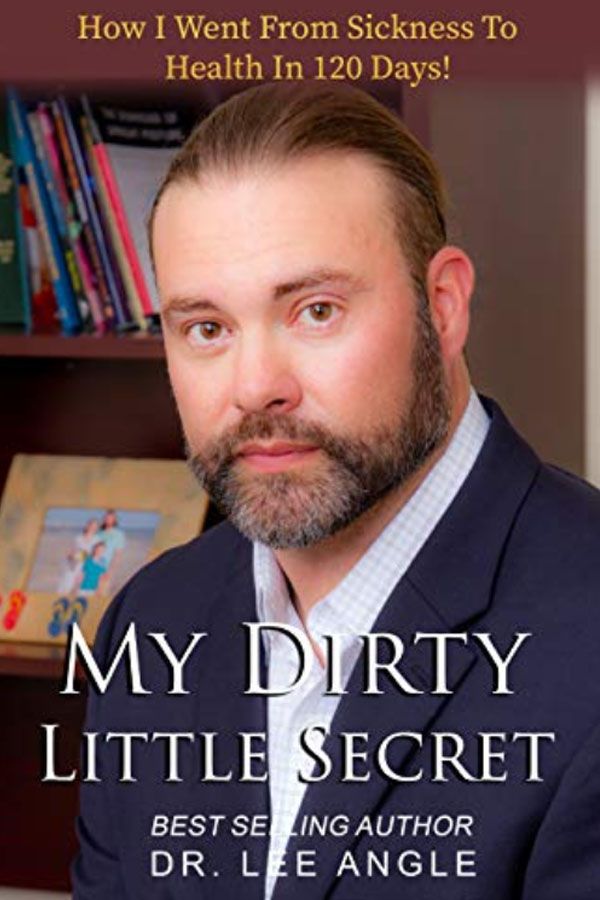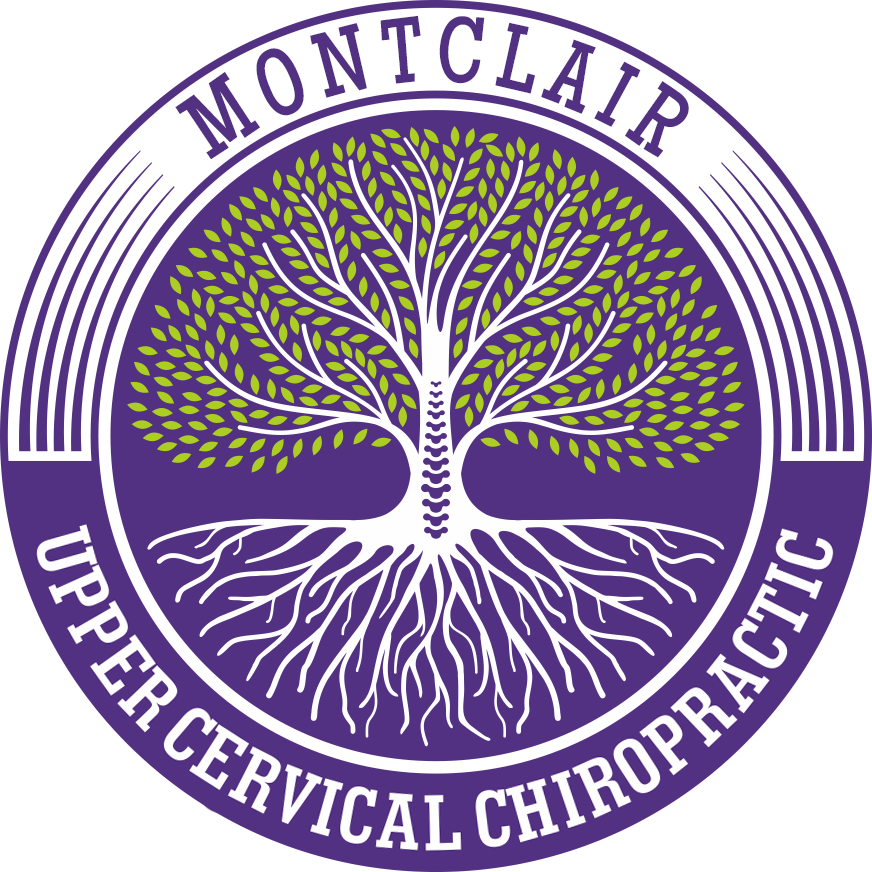
A rapidly growing form of health care that focuses on the top two bones in the neck and the function of the Central Nervous System, upper cervical care is effective for complicated conditions that have not typically responded to other treatments. Our guest, Dr. Lee Angle, is a Blair Upper Cervical Doctor out of Fort Myers, Florida. He has been in practice for several years. His book, My Dirty Little Secret: How I Went From Sickness To Health In 120 Days, has inspired numerous readers and gives them hope of a life without experiencing pain. Today, he shares how upper cervical chiropractic saved his life and some recommendations for patients under upper cervical care to get their health back.
Listen To The Episode Here
My Dirty Little Secret With Dr. Lee Angle
Regaining Your Health With Upper Cervical Care
This episode is brought to you by Setex. It is one of my favorite companies out now. They have the best gripping technology on your earbuds, eyeglasses, phones, and gaming controllers. I especially love to wear them on my eyeglasses and my earbuds. I wear my glasses all day long at work. I'm doing adjustments. Those things are not moving off my face. They are glued to my face. I used to have the issue of my glasses falling off after an adjustment. I put the Setex pads on. Those things are staying in place.
It is one of the best purchases I have made. I like to work out with my earbuds at the gym running. I used to have the issue of the earbuds falling out of the ears. That does not happen anymore. You pop those babies in with the grip pads and those things stay in place. It is a great technology. If you are interested in any Setex products, you can visit SetexGrip.com. You can get 25% off when using the promo code, DrPecca25, at checkout.
Welcome, everyone. Thank you, everyone, for reading. You guys are the best. Be sure to smack that subscribe button, leave us a review and share your favorite episodes. We have Dr. Lee Angle on the show. He is a Blair Upper Cervical doctor out of Fort Myers, Florida. He has been in practice for several years.
Upper Cervical Chiropractic completely saved his life. He even wrote an amazing book out called My Dirty Little Secret. It is available on Amazon. It goes through how upper cervical completely revolutionized his health in about four months. These are my favorite stories. This is why the show exists. Dr. Angle is a phenomenal doctor. He is passionate. He is getting many people better down there in Florida. I hope you guys enjoy this episode as much as I did. Please welcome, Dr. Lee Angle.
We have a very special guest, [Dr. Lee Angle] (https://www.LinkedIn.com/in/DrLeeAngle/). He is a Blair Upper Cervical Doctor in Fort Myers, Florida. Dr. Lee, you have been doing this for about ten years or longer?
We are up to several years now.
Dr. Lee has one of the most amazing recovery stories you will ever hear. He got a great book that I'm going to read the first page. It is called My Dirty Little Secret. Usually, I start off with a regular intro, but the first page of this book is captivating. I wanted to read it to you, and we could start the show from there. Dr. Lee, if you don't mind, I'm going to start reading the first page.
As I was telling you before, we had a similar story. Mine was from concussions, and we will jump into yours here, “I was 31 years old and the picture of health, 245 pounds of muscle, top twenty in my weight class, in the country for powerlifting. I held a state record squat. I ate cleaner than anyone I knew. Underneath it all, I had a dirty little secret. I was physically and mentally broken. It took me ten minutes every morning to unfold myself and stand up.”
“Once up, I had to hobble around on crutches for 30 to 45 minutes until I was able to put weight on my left foot. Otherwise, I would get pain so severe in my ankle that I would at times vomit. This was my daily routine for almost ten years. I suffered from weekly migraines, seemingly endless sinus infections, and more days than not, I had burning sciatic pain down my left leg. My digestion was awful. I had debilitating lower back cramps. I had to put carpal tunnel braces on both hands, the ones with metal in them, to keep your hands straight. If I didn't, I would wake up sometimes during the night feeling like I had dipped my hands in the fire.”
“All of that was on the physical side. My mental abilities were deteriorating at an even faster pace. I had always been at the top of my class, a social butterfly, and comfortable in almost any situation. I now found myself on Zoloft for my depression and anxiety, with OCD that wouldn't allow me to use a toothbrush more than once or step on a crack on a sidewalk.”
“I felt like I was losing my mind, and my body was almost gone. At this point, I had nearly given up on the idea of happy, successful life. It was a race to see which would fully collapse first, my brain or my body. I had tried medications. I tried therapy and even went to chiropractors for years. I ate like an Olympic athlete and exercised like a madman, yet there I was, feeling close to hopeless.” Dr. Lee, that is a hell of a beginning to a recovery story. You went through that for ten years?
When I was around 18 or 19 is when things started to go downhill. That is when the ankles started to be bad. The sinus infections started. I get spontaneous nose bleeds for standing around. I was exhausted all the time. My grades in school started going downhill. As my twenties went by, it all kept adding on piece after piece.
I was telling you before, I had an idea with what was going on with me because I had a nice hockey concussion. There was an incident where I was like, “This happened. That is why I'm getting these symptoms.” You must have been panicking because it sounds like there was no rhyme or reason. You were going downhill. You must have felt like you were dying.
I have played sports and beaten myself up a lot, but there was that one moment that changed everything. On our intake forms, you got checkboxes. All the time, every month, every year, I was checking more things off, and it was going downhill. I said in the book that I would always morbidly joke by the time I was 50, I would either be in a wheelchair or a mental institution. It would probably be more likely that I was getting wheeled around in the mental institution because the brain stuff was probably almost worse than the body the longer we got. It progressively nosedived.
When things were getting bad, what did you try to do to get your health back?
I was competing in powerlifting. I exercised all the time. I changed diets. I cut out anything that you shouldn't eat ever out of my diet. I drink gallons of water a day. I tried the Zoloft, and I tried multiple other meds. Zoloft was the only one that at least calmed a lot of the anxiety. I became a zombie. I gained a bunch of weight, and I sat around staring, but at least it calmed some of the other stuff down. It started to bring the OCD level down a little bit because that had gotten to where it altered my life. I had to count my steps in a room. I physically could not use a toothbrush more than once. If I tried, I would gag. I would have to throw it away.
I hate to keep saying throw up, but I even threw up a couple of times because I wanted to force myself to do it. The Zoloft calmed that down. I started going to a chiropractor when I was fifteen. That was the first thing I had. I had these horrible midback spasms that sometimes would put me on the ground, and I would have to lay there until it would let go. That is when I started going to a chiropractor.
At fifteen years old, you were getting those?
That was the first real physical symptom that kicked in before everything else developed. I went to general chiropractic for years. I had a million massages. I tried acupuncture, physical therapy, and meds. There wasn't any surgical option. There wasn't anything other than the ankle that was pinpoint. I had finally about given up on those things. I still went to the chiropractor a little because I hoped that lifting-wise, maybe it would help salvage something there. For the most part, I had given up and thought, “This is it. This is what I'm doomed to.”
How did you end up in an upper cervical office?
I was about 30. My life was terrible. I was older. By the time I was 30, my life was going nowhere. I had no money. I didn't have anything. My mom was a teacher. Education was always a big thing, and I always did well in school until later on. My brain didn't work anymore. I have somehow decided, “I'm going to go back to school. Maybe that's what will salvage my life.”
At that point, I had been altered for so long, I didn't realize how internally messed up things were. If you are in a state long enough, you start to lose it. There was an osteopathic school about twenty minutes from me. I thought about physical therapy school. Someone said to me, “You ought to go be a chiropractor.” The chiropractor I go to, I wasn't getting any results so much, but he was a nice guy. He had a great business going. Everybody loved him. Who doesn't want all of that?
I up and decided to go to chiropractic school. I put honestly very little thought into it. I needed one class to get in that I had everything else. I showed up at Sherman. Although I had gone to chiropractors for at that point, close to fifteen years, we had a Philosophy class with Myron Brown. That was the first day I heard what chiropractic was supposed to be. It wasn't neck and back pain. It wasn't mechanical. There was much more to it.
We got to the fourth quarter. We had a class called Upper Cervical Rationale, and Dr. Perry Rush, who has been an old-school Blair chiropractor forever, taught the class. The more he talked about it, I thought, “This is different. This isn't what I've heard before.” I've said this to my patients 1,000 times, “It made more sense to me that one central thing was wrong and mess everything else up that I magically had 500 different systems that weren't working correctly.” I said, “Do you take students as patients?” I started going to be a patient, and that is how I wound up in an upper cervical office.
How did his practice work? Was he a full-time teacher, or was he teaching that one class?
He was a little half and half. He taught a good bit, and he had an office hooked off the extension of his house.

What was your first upper cervical adjustment like? Some people have that amazing first adjustment. For others, it is a little bit of a rollercoaster until they start getting anywhere.
The first adjustment, he put me in the resting room. I got a splitting headache. I was happy because something had happened. I had that headache for three days. The first month I went through, almost nothing changed. Two things were better, and this was a huge one. I wasn't on my crutches nearly as long in the morning because that was normally half-hour to an hour every single day. If I went on a trip, I had to take crutches with me. It went in three stages, numb, tingling, or set on fire. It stopped being on fire, and it wasn't numb 24 hours a day. Outside of that, almost nothing to me was measurably different. I think looking back, my brain was starting to work a little bit better.
Were you a little bit discouraged or disappointed at that point?
The only thing that saved me was I was in chiropractic school, and getting chiropractic philosophy poured into me every day, so I kept thinking. I also kept thinking, “It is the only thing left. Let's give it a shot.”
Was he educating you, like, “This is going to take some time, hang in there?”
I knew he wasn't worried about it. He wasn't worried that I had got an adjustment and life didn't change. The first adjustment lasted a month, and I got adjusted again. The second adjustment was held for three months. That was an incredible three months because as much pain as I had been in before, double or triple it because everything started to change.
I couldn't sit, stand, or lay down. My hips felt like if you had tapped them, they would've shattered like glass. I probably complained then. It was hard to sleep, but part of me was excited because I was like, “Nothing else I did ever made anything change except gradually getting worse.” Suddenly now, I feel awful everywhere. Maybe something good has happened. During that period, I noticed that my grades were suddenly starting to go up because I admittedly almost failed out of school the first couple of quarters. I couldn't remember anything. I couldn't focus long or hardly enough to study, and what I did study, I couldn't remember.
I read something. I retained it. My grades started to go up with a little bit less effort. I say in the book, “One hundred twenty days.” It is true. About four months in, all of that pain that had ramped up now was almost gone. I didn't have remotely the limp I had. I wasn't on crutches anymore. I could study, take a test, do well and not study for three days straight to remember four things. I got rid of the carpal tunnel braces. I probably used the toothbrush longer than I should've. I felt like going out and talking to people and not being a hermit. Everything started to dramatically change.
One of the most difficult things about going through something like that is the mental, not so much the physical aspect of that. I felt like I was in a mental prison every day, and I couldn't get out of it. It is an invisible injury that you look healthy on the outside, but you are dying on the inside. It's tough to communicate with friends and family. People were like, “Go see a psychiatrist and talk it out. You wouldn't have half of these problems if you felt good.”
That is how I ended up trying 5 or 6 different medications. “It must be in your head. You need something to calm you down, lift you up,” or whatever the case may be, but it wasn't the problem at all.
Did you notice any side effects going on any of those medications? I remember one time the antidepressants made me more suicidal. One time they worked, and another time, they were not working, and I felt worse.
Zoloft is the one I stayed on the longest. I hardly remember the other ones other than I don't think anything happened. I know on Zoloft, I probably gained 30 pounds. I was a zombie and flat. I wasn't worried about the things that were bothering me before, but I didn't care about anything else either. I was sitting in a chair, stare and watch TV. That was it.
Dr. Lee, you are at the four-month mark of treatment. Your life is changing. Where do you go from here?
My next thought was, “This is the greatest thing that anybody ever came up with ever.” That was my next thought. I'm probably right around the eighth quarter. I'm in the sixth quarter. It is not too long until we are going to get into the clinic. Number one, I was pretty excited that I was going to not fail out of school, and I didn't feel dead all the time.
I started thinking, “This worked well for me, but Dr. Rush has been in practice for 35 or 40 years. He is unbelievably good. Could I do this myself? Is this reproducible for me, who doesn't know anything yet and has never adjusted anybody?” I started doing the best I could to learn, and I would grab anybody that came along. Dr. Hilpisch's daughter was in school, a couple of quarters behind me. I'm sure he tried to hide from me anytime he saw me in the hall because I would grab him, pull him into a room, and start asking him questions, but I wanted to know what I was supposed to be doing.
** Was he teaching down there?**
No, he would come to visit her. I would hijack him, jerk him off into a room and start helping me with questions. I got into the clinic, and I thought, “If this worked this well, I'm going to do it.” I still don't know what I'm doing. You are not good. You are scared half to death to touch somebody. People would come in and have a problem.
One guy came in and had this burning mouth syndrome for several years. I adjusted his atlas once, and it went away. I don't even know what I'm doing. I thought, “Not only did it make sense, not only did it work for me, but apparently, maybe I could do it too.” As I went through the clinic, that was it. I tried to improve those skills over and over.
We were exposed to a number of other upper cervical techniques, and nothing was wrong with them, but most people gravitate toward, “Blair is the thing that worked for me.” I'm a much bigger fan of the Blair philosophy, in general. It was a thing that worked for me. That was the only way I wanted to go when it came to my own practice.
**You graduated from school. Did you go right down to Florida? Is that where you are from, Florida?
No, I'm from West Virginia.
Did you go right down to Florida, or did you go somewhere else?
There was lots of moving around. I went to Tennessee first. I have been to several places. I was in Florida once and came back, but I have been in this office now for several years. Now I'm nice and settled in.
What do you see in your practice? Do you see a lot of similar cases as you? Do you see a lot of post-concussion, Meniere stuff, vertigo, a lot of unexplainable issues where people have been writing off, and they start to get better?

The most common thing is somebody sits over there and says, “I had brain scans, MRIs, CT scans, nerve studies, this and that, and all of it came up negative. They can't find anything wrong with me.” Sometimes it almost gets to the point they tell me to go to a psychiatrist or take some meds. They don't see a tumor, hemorrhage, or some big, giant thing, and nobody knows what's wrong with them. This is, unfortunately, the last stop. It would be nice if it was the first stop. It has tons of those things or tons of conditions that they can identify, like Meniere's. They see a ton of those, but they don't know what to do with them.
It is like, “What do we do now?”
Let's take little meds. Let's try not to eat any salt, and I'm still miserable all the time or whatever the case may be. You get tons of that thing.
Dr. Lee, would you consider Dr. Perry Rush a mentor of yours?
Absolutely.
What were some of the big takeaways you have learned from him?
One of the biggest is that guy started practicing, I might have the date slightly wrong if he hears this, but maybe 1977 or somewhere in there. When I started going to him, that would've been 2006. Let's call it about that. Decades of that. Every single day, that guy was down there practicing on his headpiece to get better. I'm still going to get better. The two biggest things were that. I never saw him cut a corner. With Cone Beam CT now, it is much easier. It is hard to take a bad film. You have everything there. Back when it was Blair, you had to mark all the points and do everything else.
He had taken that many X-rays. He probably could have aligned somebody up, shot a film, and 9 times out of 10 hit it anyway, marked every single point, and never cut a corner anywhere. Your care was as a textbook and as straight through as it possibly could have been, and everybody got that. He didn't rush. He didn't hurry. He didn't do any of those things. It was piece by piece to make sure that everything was done exactly right. The adjustment was practiced a million times so that he could deliver it as best as he possibly could.
I was interviewing Dr. Lenarz and tell me if you agree with this. He has many years into practice. He says he is better now than he was several ago. The guy is so amped up to be in practice. He still loves it as much as he did several years ago.
Partly from a personal standpoint, once you learn what you are doing and you get financially straight because, let's be honest, in the beginning, you got to make money too. You’ve got to live. Trying to get people in the office and build a practice is stressful. I think a lot of that. It is hard for it not to detract from your love of taking care of people because you are busy trying to take care of an office, your family, whatever that is.
The longer you go and the more stable and all that's stable now, you don't have to worry about people coming in. You don't have to worry about finances. You can get right back to loving what you do. I would agree. The better my practice has got, the more exciting I am about taking care of people because all those other things, to some degree, take care of themselves.
Dr. Lee, how long did it take you in your experience to feel you were fully back and healed? I know with the four-month mark, you have almost felt 100% better. I remember it took me probably about a year and a half to look in the mirror and be like, “I am better than I ever was.” Every couple of months, something would continue to get better.
Close to two years. I felt like there was nothing. Everybody has got a bad day. Stressful events, in general, whatever that stress is, will trigger your weaknesses. Even when I felt pretty good on an average day, if boards were coming up or something else, it would trigger the weaknesses, and things would kick in. I would say two years and then I felt almost bulletproof again and back to feel I hadn't for many years. I'm 47 in 2022, and I feel infinitely better than I knew when I was 27.
*A lot of people have no idea what upper cervical chiropractic is. If you are explaining it to patients or somebody who is reading this for the first time, what is it about the upper cervical that works? *
I have two go-to explanations. You've got your brain up here. The brain decided you were going to put those glasses on that shirt. You are going to get this microphone. The brain stem that comes down into these top two bones controls everything else. That everything else is a lot more important than what this is doing. That is a simplistic explanation. Naturally, the brain does more than that.
If that brain stem has pressure on it or it is not functioning properly, that is why if you put ten people in a room who have an upper cervical misalignment, you very likely may have ten different sets of symptoms. Anything in the world can be affected. It is why you do keep checking boxes off. We are looking for millimeter little misalignments. 1 or 2 millimeters can wreck your life.
I didn't have that big of a misalignment. I had a messy neck. If you looked at my C1, that atlas misalignment, that thing was probably this big. Something this big had completely utterly ruined my life. That is the key. You released that pressure. The thing that controls who, what you are, and what you do now can start to function. Your body can start to heal as it was designed to do. That is the magic.
The other magic part about it that you were touching on before is the holding. When you are going through everything you went through, the last place you want to be 3, 4, or 5 times a week is a doctor's office or getting your neck cracked every single time. It puts the power back in your hands to heal yourself, what you desperately need.
I always tell patients, “If every single time you come in, we have to adjust you. We are back to mechanical, and we are a hamster on a wheel. If that pressure is what got you in trouble, and it only stays for a day or two, we are not getting anywhere.” You have to hold this healing is the old saying, but you have to hold, or you are never going to get there.
I was looking at your book here. Chapter ten, How Long Does It Take?
When I first started, you felt like you have to answer that. When people ask me, “How many visits do you think it will be? How long do you think it is going to take?” I don't know. Everybody is different. There is a small group of people, I always call them light switches. You adjust them, and it is like you flipped a switch, and things they had their whole life disappear overnight. It is unbelievable.

The rest of us, and that is based on my story where I was, it is a gradual climb up. I don't know how long it takes. It took me many years to get sick. It wasn't going to take me a day or two to get better. Who knows? We all know if you clear an atlas out, generally, things start to improve at some point to some degree. Maybe they are not the big flashy things that you were hoping for on day one, but it takes as long as it takes. I don't know how fast somebody's body heals versus somebody else's.
The question that we have all gotten so many times too is, “Why don't I know about this? Why are there not many people doing this?” It is growing, but why do you think there are not a lot of people doing the upper cervical work?
I haven't been around schools that much for years. I know when I was in school, a number of schools didn't teach it. We were at an Irene Gold Board Review in Atlanta. I went to lunch with a bunch of people, and I didn't know half of them, and everybody was going around because we were getting ready to be done.
I'm going around the table, “What practice are you having?” I remember there was a guy from Texas Chiropractic College. I said, “Upper cervical.” He looked at me and said, “What is that?” I was baffled because I went to Sherman, where that was brought up and talked about. That is part of it. I think it wasn't taught enough. Even within that, a lot of people in my class and around me heard it and they didn't do it. Sometimes, from both a practitioner and a patient perspective, it seems too simple.
If you go to a big hospital system, multimillion-dollar equipment, all these doctors, smart people, all these experts, million-dollar MRI machines, nobody could find anything wrong with me. Are you telling me that little Dr. Lee over in his little office on that little black table he has got, he can do a little thing that nobody else did, and it is going to heal me? That seems too easy sometimes. It seems too easy from a practitioner's standpoint.
It is far out of our health paradigm. It is like, “What? He touched a bone in your upper neck, and you started to heal?” It is tough for people to grasp.
I think it was Kirk Erickson, if it is not, I apologize, that made the comment that it takes some guts to tickle somebody behind the ear, leave them alone and tell them everything is going to be right. I think sometimes that is true. I'm going to adjust your atlas, and your heart problem is going to go away. I don't necessarily say, “I'm adjusting an atlas for a heart problem.” I'm adjusting an atlas and your body is going to work right. Potentially that will get better. I'm not sure everybody can buy into that. It was easy for me because I had such a personal experience.
One of the most important things in our work is knowing when to leave that alone. If you give that adjustment they don't need, you are going to ruin everything. How do you know when to leave that alone, Dr. Lee?
That is why you got to have objective testing. I'm huge on the scanner, thermography, leg checks, and other things. BJ always said, “When in doubt, don't.” I remember one time in practice. This poor girl came in with such bad sciatica that her husband had to carry her in the door. She was bawling, crying. I adjusted her, and within three days, the sciatica was gone.
She was good for almost eight months. She came in one day. I could not clinically say she needed an adjustment. The scan didn't look like she needed an adjustment. The leg check, all of it wasn't off. I felt bad for her because she was being carried again. She is crying so much. I'm taking my head and saying, “This is how she was symptomatically the last time. Maybe it is showing different. It has been a while.” I adjusted her.
She never got better under my care after that. She had to go and have other things done. I had been in practice a year and a half then, and unfortunately for her, I tell I learned my lesson. That was the one big moment for me that held up with when in doubt, don't. The worst case is she goes, and she is mad at me or thinks I didn't help her, but at least I didn't make it worse.
That is why it is crucial to stick with the upper cervical work as a doctor for several years because you learn so much. Every upper cervical doctor has made that same mistake, and you learn from it.
Hopefully, it doesn't take too many times to learn, but what is the worst case? You don't adjust them now. You tell them, “Come back in a day or two because I'm not sure. The tests aren't clear. We don't want to do anything that is going to mess you up. Come back in a day, and we will see how it sits.”
How do you find the healing cycles go that famous upper cervical chart for the first six weeks is up and down, you hit rest phase 3, 6, to 9 months? Do you find that to be true?
Probably for the most part. Everybody has a trauma history. Do they eat clean? Do they eat junk? Are they on ten medications? Are they not on ten medications? How much does your body have to fight through to heal? If you come to me, you are on no meds, eat clean, and exercise, the chances are your body will heal faster than if you never move, take five drugs, and eat junk all the time. All those factors will play with it a little bit.
Are there any recommendations you give your patients under upper cervical care that they can implement where you find them stable and you say, “You can start addressing other things, whether it be diet, exercise, or anything like that?”
I do, to a point. The initial recommendations are here are the things to watch out for doing. Once we get stable, depending on what their problem is, maybe it is postural exercises or throw a few supplements in. If I ask them, “How do you eat?” They say, “I eat terribly.” I say, “You are going to feel terrible.” It is hard to heal from eating Twinkies all day. You will give some advice that way and make sure you drink enough water your body needs. If I'm going to regenerate and heal things, I need the proper fuel to do so.
What are some of the recommendations you give, especially at first adjustment, for how long, and things not to do to help you hold that adjustment?
The first question I ask everybody afterward is, “What position do you sleep in?” If they say, “I sleep on my stomach.” Already, we are not going to be friends. We have got to fix that and have better posture when we sleep. Do you work at a desk all day? Do you lean way in? How do you sit? It is more of those things. Don't make great big head movements. Lord knows that the bane of our lifetime is having a phone and having your chin tucked down.
You can tell somebody, “I can do the best work ever done up here.” If you are sitting around with your phone twenty hours a day down, it is hard for it to hold. Be careful where you are and be aware of where your head is because a lot of people are not. If they have terrible neck pain, they are already aware of it. If you come in with many other things, you have got to be somewhat conscious of what you are doing.
What if somebody is like you or when you were nineteen, big powerlifters, and they want to get back into the gym as soon as possible? What are your recommendations for that?

I usually tell them, “Initially, nothing overhead for the first 2 to 4 weeks.” This movement puts strain on the neck. Let's watch out for that stuff that is more in this plane, like a bench press or a row. The body handles it better. It doesn't put a strain on the neck. I don't tell people not to do anything. If you are used to moving and you don't move, you are going to feel terrible. Your body needs movement like it needs good food to heal up, but back everything down a little bit, and let's cut some certain things out so that we are not straining the neck. If you usually run, don't run. Go for a walk.
I'm not big on being told not to do things anyway. I try not to say, “Don't do anything.” People don't like that either. If every time you golf, you can't walk for three days, now, we are probably not going to have to golf for a bit until we get this thing healed up and maybe go hit a bucket of balls at the driving range. That was pretty good. Go play nine holes, and let's progressively build back up. Part of the reason for getting better is you can enjoy your life and do the things you want to do. We’ve got to figure out the smart way to get back to those things.
A lot of young athletes and even guys that love movement. They love working out. When you tell them not to do anything, they get deflated. I feel like that can interfere with the healing process. I like how you can gradually take it easy for a little bit. Stay away from the overhead activity, and we will get you back to doing what you love to do.
It does deflate. Not only do I feel bad, but now, you are telling me I can't do anything. I'm not enjoying this process at all.
Dr. Lee, I know you are getting back into your next shift here soon, but where are you located? Where can people find you to make an appointment with you?
I'm in Fort Myers, Sunny, Florida. We have a few hurricanes. You don't have to worry. UpperCervicalFortMyers.com is the website.
That is the easiest thing. Go in there and find the phone number or click a button. You can fill out a form, and we will call or email you in. That is the easiest thing.
At the end of every episode, I would like to ask all my guests, what is one piece of advice that has resonated with you over the years that you would like to gift the audience? It could be anything.
From the doctor’s perspective or the patient perspective?
Anything. You could do one of both if you want.
I like that this show is called Expect Miracles. Expect the miracle. Don't expect it now. Maybe it is going to come now, and it is going to come like we both discussed, months down the road. Our results, I will never claim it is 100% of every patient got better, but almost all of them got better. Maybe they get 100% better, but they got drastically better than when they came to me.
From the doctor’s perspective, I shot a Facebook live. You, I and a lot of upper cervical doctors have a great story about what got them better. When you have been the sick person sitting in the chair over there, and now you are on this side of the desk, it is much easier to identify with what they are dealing with, listen to them and let them be heard.
The reality is when you practice this way, they could be mute, they could never fill out a form or they could tell you nothing. You could go through your process, and you could get them better, but people like to be heard. I wanted to be heard. Yeah. Even knowing that now, I still don't want to walk in and never say a word.

Listen and have some compassion. If they get frustrated, understand they are not frustrated at you. When I was early in practice and somebody wasn't getting better and they asked me a question, I freaked out. “They are unhappy with me. They are unhappy with this.” No, we all want to get better faster. Nobody is coming at you and saying, “You are not good at your job.” They are frustrated that things aren't getting better. Just as the patients need to be patient in getting better, the doctor needs to be patient in understanding that they want to get better faster.
Dr. Lee, is there anywhere they can get this book?
In Amazon. You can order the hard copy, or the Kindle version is on there.
Anybody reading the blogpost that wants to dive a little bit deeper into Dr. Lee Angle's story, the book is called My Dirty Little Secret, and you can find it on Amazon. Dr. Lee, thank you so much for coming on. I appreciate your time. Your journey back to health is phenomenal. You are helping many people get their lives back under upper cervical care. There is nothing better in my book. Thank you so much for taking the time and being on the show.
You are welcome. If I can throw one more thing in, I'm looking for an associate doc to help me get more people. If anybody is reading and you like to come to Sunny, Florida, shoot me an email at DrLeeAngle@Gmail.com, and we can talk. Thank you for having me.
That is a great opportunity for any chiropractic students or any doctors that want to do the upper cervical work. Dr. Lee is hiring. Hit him up if you are looking for an associate position. Dr. Lee, thank you so much for joining us. I will be in contact.
Thank you very much for having me.
Important Links
Love the show? Subscribe, rate, review, and share!
Join Expect Miracles community today:
